The Next 100 years of Activism from Civil War Legacies to Active Citizenship:
Mrs Justice Catherine McGuinness
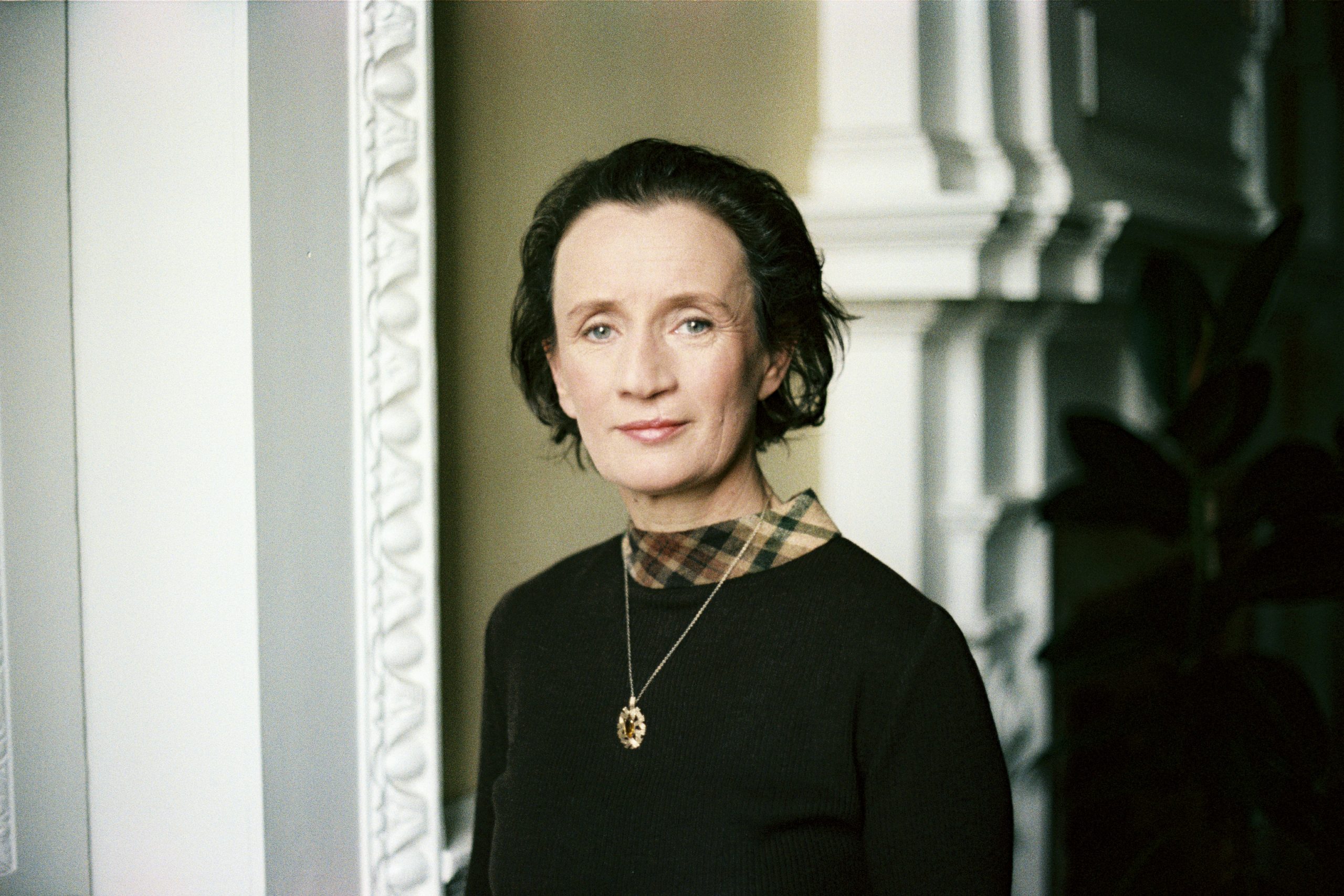
As Mná100 ends, in this final piece, it looks to the next generation of revolutionary women.
On Wednesday 25 October 2023, Dr Sinéad McCoole sat down with Catherine McGuinness to discuss her life and reflect on her mother-in-law Mairead McGuinness (née de Lappe) who had been imprisoned during the Irish Civil War. You can listen to their conversation below and read a short biography which is based on this interview, and gives more context to her life and many achievements.
Best known by her married name, Catherine McGuinness was born Catherine Isabel Brigid Ellis in Dunmurry, County Antrim, Northern Ireland on 14 November 1934. Her parents were Sylvia and Robert Ellis.
The couple had moved to the village of Dunmurry two years earlier, when Robert Ellis was given the job as curate-in-charge of the congregation of St. Colman’s Church of Ireland. The church was located in the village of Dunmurry on the main Belfast-Lisburn Road, now in the hinterland of West Belfast.
Catherine was the couple’s first child, her birth was followed by two other children, brothers Ernest Stewart who arrived on her second birthday in 1936 and Stephen who was born in 1944.
Catherine’s parents met at Trinity College Dublin. Robert Ellis (1906-1994) was born in Clare, his family came from Spanish Point, West Clare. His father, Captain Ernest Albert George, was in the British Army and fought in the First World War. He contracted tuberculosis and he died in 1931, aged 52. The family moved to Dublin. Robert’s widow, Mildred had five young children. She made money by letting rooms in the family home on Palmerston Road to Trinity students. Catherine’s father, Robert, the eldest, was in boarding school in Galway Grammar School when his father died. After his schooling he came back to Dublin to attend Trinity College to study theology.
It was at university that Robert Ellis met Sylvia Kathleen Eleanor Craig (1908-1985) from Tullamore, County Offaly. Her father, Rev. Robert Stewart Craig, was a clergyman and two of her brothers also would take holy orders – Rev. Graham Fetherstonhaugh Craig and Rev. Cecil Henry Stewart Craig. Sylvia was well aware of the work of a clergyman’s wife; alongside her duties for the parish, she maintained her friendships with her college friends. Catherine recalled her mother’s friend’s visits to her home and remembered their conversations and their love of literature. Catherine’s childhood years coincided with the Second World War and some of Catherine’s earliest memories were of the ruined homes which had been bombed. The family stayed living in Dunmurry and her father Robert Ellis became the Rector of St Colman’s in 1945.
In 1946, at the age of 12, Catherine went to Dublin to attend Alexandra College which was known for its high quality of education for girls. Catherine was a gifted student and had been offered scholarships to other schools. She boarded at the Clergy Daughters’ School, Earlsfort Terrace, Dublin. It had been set up as a separate school for the education of the daughters of the Irish clergy but by the time Catherine attended it was attached to Alexandra College. Her years in the school culminated in her becoming Head Girl.
Following on from her schooling in 1952 Catherine went to Trinity College to study modern languages, Irish and French. She never returned to live in Belfast, but visited often as her parents remained living in Dunmurry for the rest of their lives.
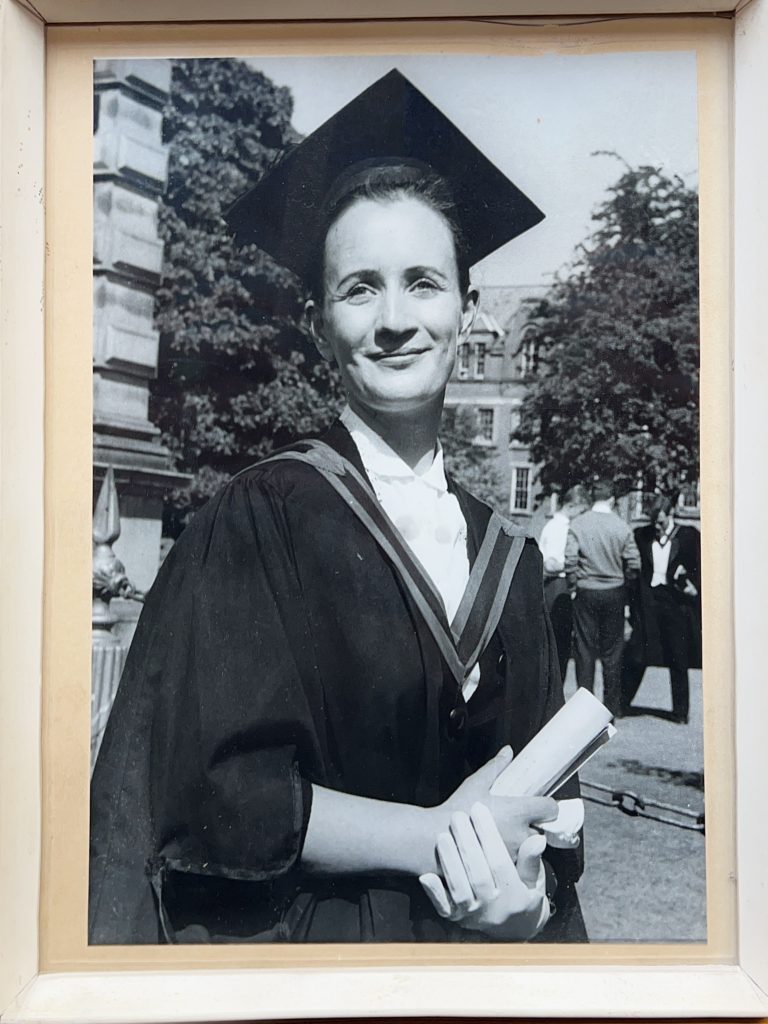
While Catherine was still at university, she married Proinsias Mac Aonghusa, in 1955, when she was 21 and he was 22. Proinsias was not a student at the university; a native Irish speaker he was at the college as part of the Irish language society. He was already an actor at the Abbey Theatre. He had worked for Radio Éireann since he was 19, firstly as an actor, and later as a reader of short stories in Irish and English. By the time he met Catherine he was already involved in current affairs programming. After university Catherine began teaching at her old school, Alexandra College.
In 1957, two years after she married, Catherine had her first introduction to electioneering when her mother-in-law Mairead McGuinness stood for election. Mairead was not elected, but Catherine’s life in politics had begun.
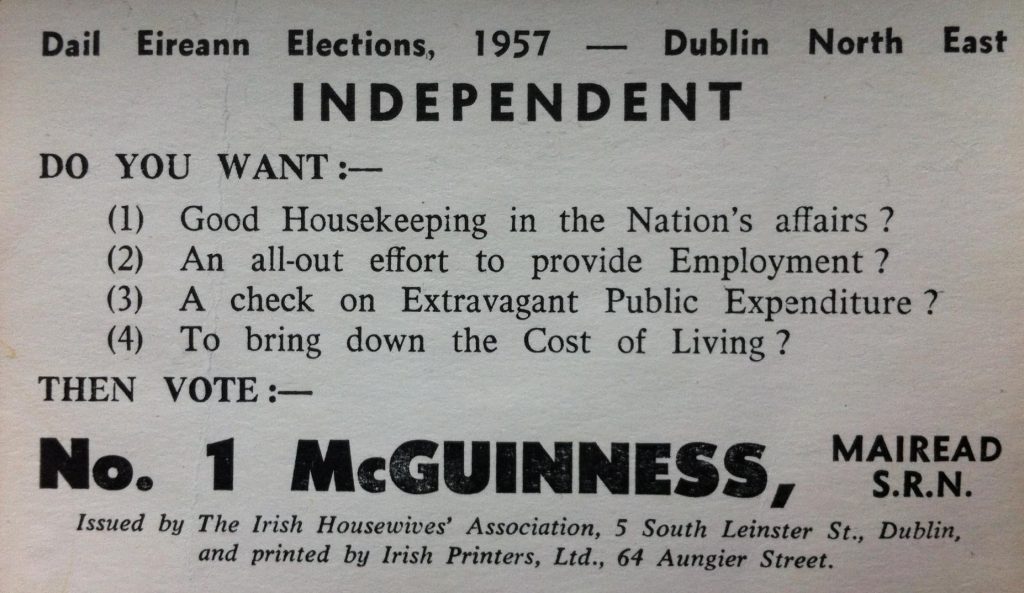
Catherine and Proinsias joined the Sean Connolly branch of the Labour Party which has been described as a ‘haven for intellectuals.’ In 1961 Catherine became a Parliamentary Officer at the Houses of the Oireachtas, working for Brendan Corish, the party leader.
Her husband was a freelance broadcaster, maintaining his own recording studio and working through his own company. He became involved in television with ‘An Fear agus a Scéal’ and also wrote for newspapers. In 1965 Catherine supported her husband’s election campaign when he was the Labour Party candidate in the Louth constituency. He was, for a period, Vice Chairman of the party but he was expelled from the party in 1967. As a result, Catherine stepped down from her position as a Parliamentary Officer.
Catherine gave birth to their daughter Caitríona in 1963, two years later in 1965 a son, Donal, was born and the youngest, Diarmaid, was born four years later in 1969. That year Proinsias stood as an independent candidate in the Dún Laoghaire constituency, once again Catherine was actively involved in his campaign, but he was not elected.
At this time Catherine was part of the campaign for the establishment of a school in her locality. Newpark Comprehensive School, formed from two Church of Ireland schools. It became well known as a progressive school, being the first in Ireland to have a Transition Year. It opened as a state comprehensive in 1972. It was celebrated as being a centre of educational innovation.
By the early 1970s Proinsias was a well-known broadcaster with success in Irish language programmes such as Féach.
In 1975 and 1976 he took a break from his broadcasting career to work as a United Nations Special Representative in Southern Africa where he worked with Seán MacBride. They were involved with the Namibian War of Independence. He set up a radio station to assist the South West African People’s Organisation, who were fighting for independence from the Apartheid Government of South Africa. Catherine and the family lived with him in Lusaka, Zambia during those summers and were visited there by his mother Mairead McGuinness. In Ireland they were close friends with Kadar Asmal, the founder of the Irish Anti-Apartheid Movement. He was a Professor of Law at Trinity College and he encouraged Catherine to do a degree in Law. He was later a Cabinet minister in the first post-Apartheid Government in South Africa lead by President Nelson Mandela.
While her husband returned to work in RTÉ on the television programme Féach, Catherine returned to Trinity to study Law. Thereafter she went to the King’s Inns. In 1977 she was called to the Bar and began her legal career. By then she was 42. Her children were 14, 12 and 8. From the outset Catherine became active in Family Law, it was a time where there was little legislation in the area and very few supports for people whose marriages had broken down. She became associated with pioneering change over her career both in the law and in shaping legislation. In 1979 Catherine returned to the Houses of the Oireachtas when she was elected a Senator for Trinity College in a by-election in December that year. She was re-elected in 1981 and again from 1983 until 1987. During her time in the Seanad, she played a major role in opposing the introduction of the 8th Amendment to the Constitution and in supporting the campaign to remove the constitutional ban on divorce in 1986.
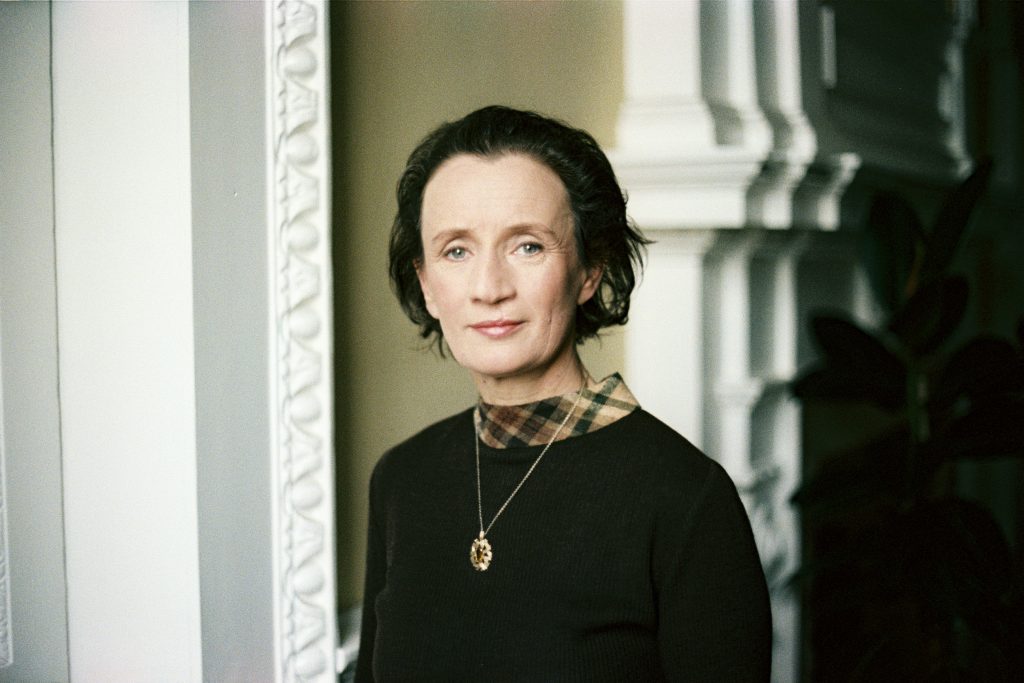
On 2 May 1988 President Patrick Hillery appointed Catherine to the Council of State serving until the end of his term in 1990. In 1989 she was called to the Inner Bar.
In 1994 Catherine became the first woman appointed as a Circuit Court Judge. That year Catherine was appointed as the chair of the Forum for Peace and Reconciliation, which was established by the Irish Government following on from the Downing Street Declaration in 1993. It was described in the newspapers at the time as a ‘forum to consult together and share in dialogue about the political future.’ Its first sitting was on 28 October 1994. The forum met at Dublin Castle over the next two years, it had 41 plenary sessions, commissioned reports, the Joint Framework Document (1995) and Paths to a Political Settlement: Realities, Principles and Requirements.’ (1996).
In 1996 Catherine was appointed to the High Court.
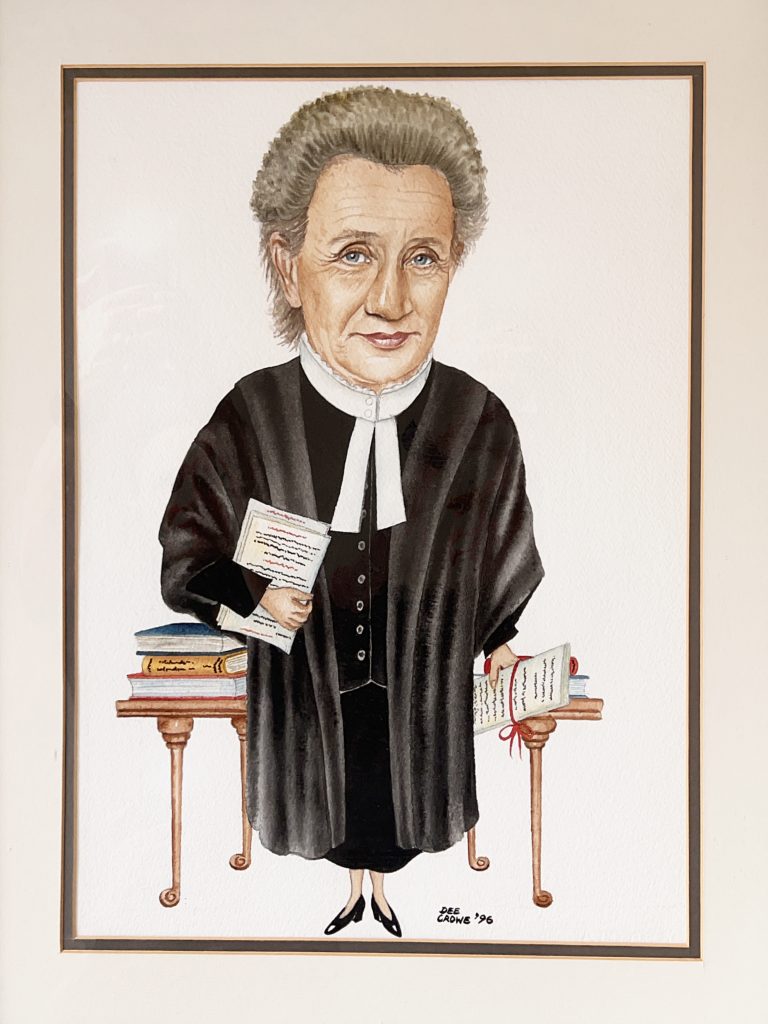
Illustration of Catherine McGuinness as a judge. Courtesy of the Mac Aonghusa Family Archive.
Catherine was elevated to the Supreme Court in January 2000 serving until 2006.
During her time in the Supreme Court, Catherine’s husband died, in 2003. They had celebrated 48 years of marriage.
The years that followed were full of appointments. In February 2005 she took up a five-year term as President of the Law Reform Commission.
Also, in November 2005 Catherine was appointed Adjunct Professor at the Faculty of Law at the National University of Ireland, Galway. The family had always had a home in Galway, where Proinsias had spent his childhood and youth. Catherine had a love of the county from her time there during her college days, when she had lived with a family in Spiddal to perfect her Irish.
In November 2011 Catherine became the Chairperson of the ‘Campaign for Children’ also called ‘Yes for Children’. She led the civic campaign to bring change to the amendment to the Constitution. In 1993 prior to her appointment to the Circuit Court, Catherine McGuinness was asked by then Minister for Health Brendan Howlin to lead the Kilkenny Incest Investigation into failings over a 15-year period by relevant state agencies for the rights of a victim of incest. The report led to changes in childcare law, and the campaign to have the rights of born children inserted into Articles 14 and 42 of the Irish Constitution.
Also in 2011, she was appointed as an Irish representative to the Organisation for Security and Co-operation in Europe by then Tánaiste and Minister for Foreign Affairs, Eamon Gilmore. Her remit was the combating of racism, xenophobia and discrimination, also focusing on intolerance and discrimination.
Her name added gravitas to campaigns and organisations. In 2009 she was awarded the Lord Mayor’s award for her contribution to the ‘lives of children and families in the city {by her} pioneering work’. In 2010 she was named as one of the People of the Year, an award which acknowledged her long-standing service to the Irish people.
In 2013 she joined the campaign to end direct provision and the same year she became the Honorary President of Trinity College’s Legal Advice Service. Awards and honorary doctorates came from the NUI, the University of Ulster and the Royal College of Surgeons.
That same year Catherine was appointed by then Minister for Communications, Energy and National Resources Pat Rabbitte, to chair an expert panel to examine the possibility of underground routes for the national grid.
In 2014 The Children’s Rights Alliance established ‘The Catherine McGuinness Fellowship on Children’s Rights and Child Law’. This one-year programme is for a newly qualified barrister to work as part of a legal and policy team. This reflected a lifetime of work which spanned from Parliamentary Officer to a Judge of the Supreme Court.
She was appointed to the Council of State for a second time after the election of President Michael D. Higgins and served until 2019.
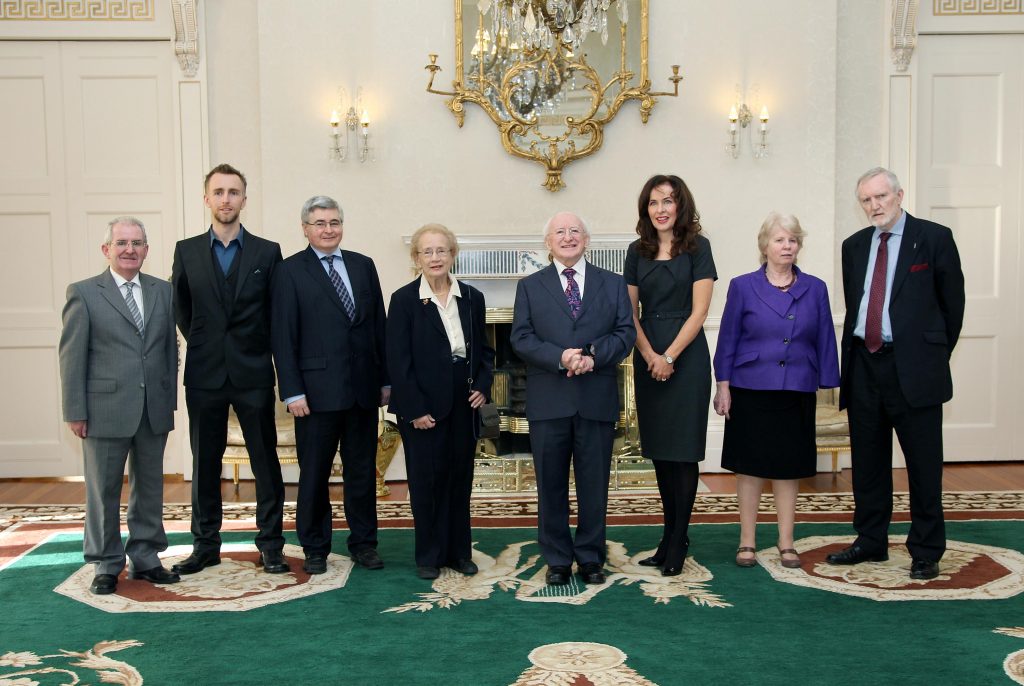
In 2015-2017 Catherine chaired the National Council of the Forum on the End of Life following on from a Hospice Foundation investigation that began in 2009. This led to the formation of the National Council. Speaking at the time Catherine said ‘as citizens and as a society we need to break the taboo that surrounds death. We need to support each other to develop a greater sense of personal responsibility and put effective systems in place.’
During the Repeal the 8th Campaign, Catherine campaigned on TV and radio, spoke at events and handed out leaflets. Three generations of her family took part, and Catherine’s pleasure at the outcome was recorded.
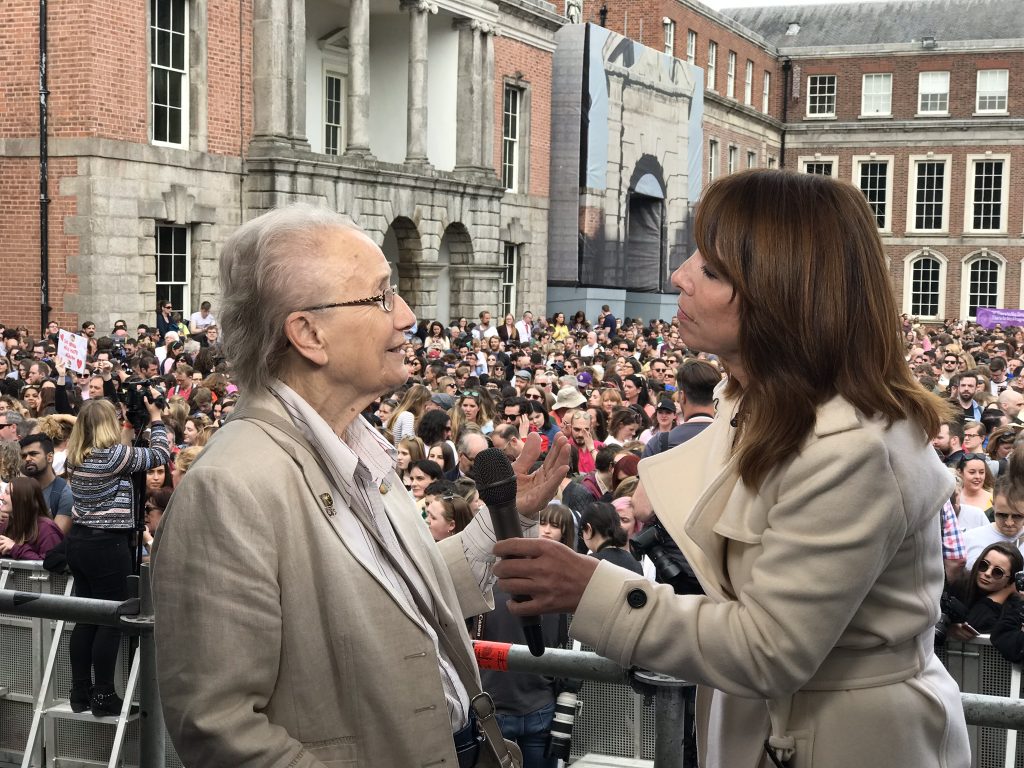
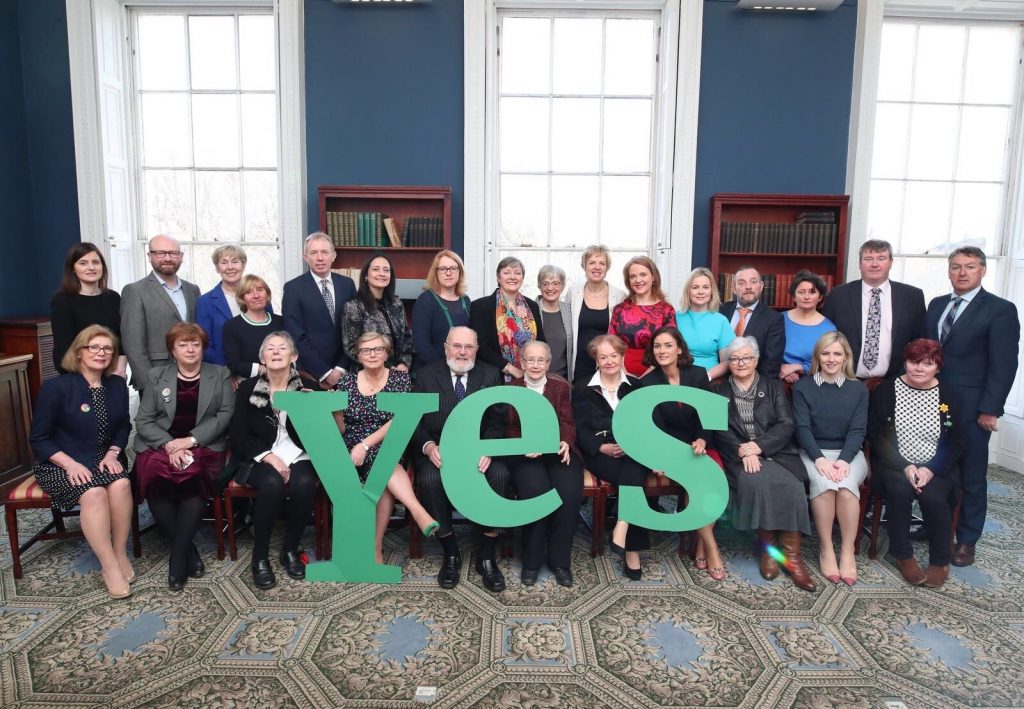
Now in her 80s Catherine’s energy to engage continued as she took on the Chair of the National University of Ireland Galway, Governing Authority, a position she held until December 2022, aged 88.
Today her image hangs in many public buildings, with works on the walls of Alexandra College, the Houses of the Oireachtas, at the Aula Maxima, National University Galway and the National Gallery of Ireland.
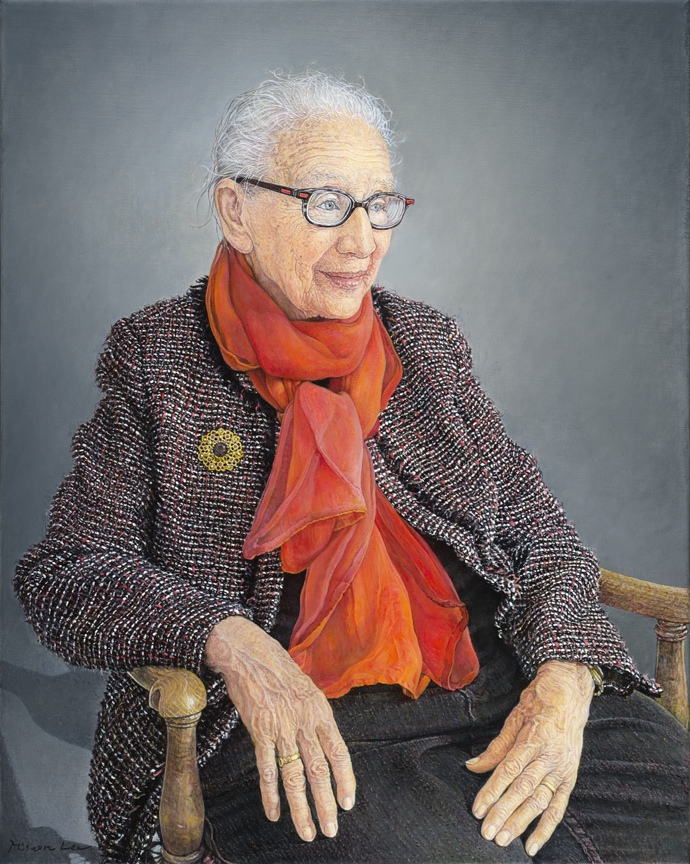
© Miseon Lee. Photo, National Gallery of Ireland
Thank you to Diarmaid and Cian Mac Aonghusa as well as Vivienne Wood and Ian Doyle for assisting Mná100.